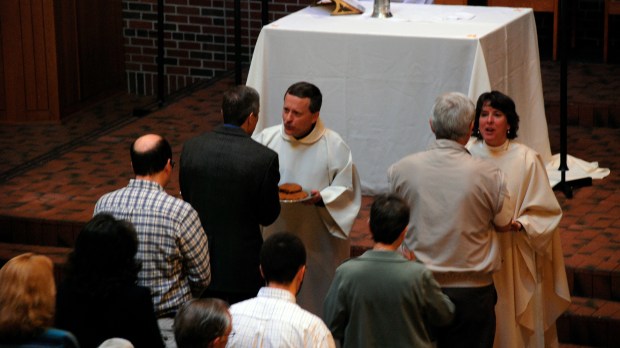From Crux:
Pope Francis and the global Lutheran leader have jointly pledged to remove the obstacles to full unity between their Churches, leading eventually to shared Eucharist. They made the commitment in a joint statement signed before a congregation of Catholic and Lutheran leaders at the conclusion of a joint service in Lund, Sweden, to commemorate the 500th anniversary of the start of the Reformation. The statement was signed by Pope Francis and Bishop Munib Younan, who is president of the Lutheran World Federation (LWF), which was founded in Lund in 1947. After they finished signing, the congregation stood for a long round of applause as the two leaders hugged each other. The two leaders appeared to single out married couples where one partner is Catholic and the other Lutheran. “Many members of our communities yearn to receive the Eucharist at one table, as the concrete expression of full unity,” they noted.
The statement says in part:
While the past cannot be changed, what is remembered and how it is remembered can be transformed. We pray for the healing of our wounds and of the memories that cloud our view of one another. We emphatically reject all hatred and violence, past and present, especially that expressed in the name of religion. Today, we hear God’s command to set aside all conflict. We recognize that we are freed by grace to move towards the communion to which God continually calls us. As we move beyond those episodes in history that burden us, we pledge to witness together to God’s merciful grace, made visible in the crucified and risen Christ. Aware that the way we relate to one another shapes our witness to the Gospel, we commit ourselves to further growth in communion rooted in Baptism, as we seek to remove the remaining obstacles that hinder us from attaining full unity. Christ desires that we be one, so that the world may believe (cf. John 17:21). Many members of our communities yearn to receive the Eucharist at one table, as the concrete expression of full unity. We experience the pain of those who share their whole lives, but cannot share God’s redeeming presence at the Eucharistic table. We acknowledge our joint pastoral responsibility to respond to the spiritual thirst and hunger of our people to be one in Christ. We long for this wound in the Body of Christ to be healed. This is the goal of our ecumenical endeavours, which we wish to advance, also by renewing our commitment to theological dialogue. We pray to God that Catholics and Lutherans will be able to witness together to the Gospel of Jesus Christ, inviting humanity to hear and receive the good news of God’s redeeming action. We pray to God for inspiration, encouragement and strength so that we may stand together in service, upholding human dignity and rights, especially for the poor, working for justice, and rejecting all forms of violence. God summons us to be close to all those who yearn for dignity, justice, peace and reconciliation. Today in particular, we raise our voices for an end to the violence and extremism which affect so many countries and communities, and countless sisters and brothers in Christ. We urge Lutherans and Catholics to work together to welcome the stranger, to come to the aid of those forced to flee because of war and persecution, and to defend the rights of refugees and those who seek asylum.
UPDATE: A few people on social media have raised questions about the Lutheran teaching and belief regarding the Real Presence. I found this resource, which offers a detailed explanation:
Ever since the sixteenth century Reformation, the doctrine of transubstantiation has remained a controversial issue between Roman Catholics and Lutherans. Although both acknowledge the dogma of the real presence of Christ in the Eucharist, Lutherans reject the doctrine concerning the conversion of the earthly gifts (bread and wine) as a philosophical explanation, which has nothing to do with revelation.
He goes on to give some dense but crucial delineations between Lutheran and Catholic belief on the subject. Read it all.

